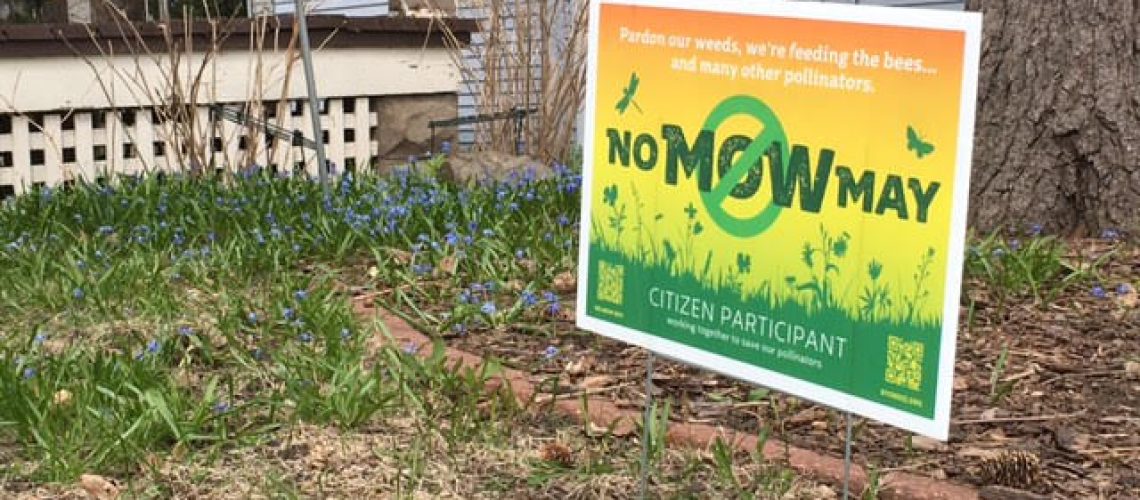CONSERVATION CORNER
A weekly blog for all things conservation
 From Kevin Brown, BCCD -this is a reprint from an web article I saw the other day. It hit home after I was mowing lawn the other day and was concerned of the number of honeybees that would not leave their flowers, even if I slowed way down, and went through the mower. Bees are already in huge decline without us killing even more this way. What is the answer? Authors: Alex Schultz, Co-Chair of Pollenablers–Fox Cities, Bee City USA Appleton Israel Del Toro, President of Appleton Pollinator Project, Bee Campus USA Lawrence University The Appleton Bee City USA affiliate group, Pollenablers-Fox Cities, and the Bee Campus USA affiliate group, Appleton Pollinator Project, teamed up in 2020 to launch the United States’ first No Mow May initiative, an import from Great Britain’s Plantlife organization. The basic tenet of the program being the voluntary delay of early lawn mowing for the month of May increases spring pollinator habitat and foraging opportunities as early flowering grasses and sedges are allowed time to blossom and provide an essential boost of energy for pollinating insects. Knowing how deeply ingrained the notion of manicuring a perfect lawn is in the American psyche our groups, as well as Appleton city staff, anticipated far more resistance and pushback from the community. In the beginning, there were fears that the program would increase animosity and conflict among neighbors, that it would lead to explosions of rodents and ticks in tall grasses, and that it would destroy lawn mowers as they moved through knee high grass. Not only did those things not come to pass, but to everyone’s surprise, weed complaints rose only negligibly and a large portion of the community participated in the program.
Even more surprising was the impact of the program in its first year recorded in the data collected by community scientists. We found that no-mow lawns had 5 times the number of bees and 3 times the bee species than comparable mowed areas. Our sampling in 2021 also showed an increase in overall insect diversity and abundances in unmowed areas. This has potential upstream effects for pollination and sustaining other animal biodiversity in urban spaces. Springboarding from the success of 2020, we repeated the program in 2021 with greater support from the city of Appleton’s Common Council, and we also saw the expansion of No Mow May to ten other communities around the state. The big discovery of last year was a verified siting of the endangered rusty patched bumble bee in one of our community parks, a sure sign that the program was having a real impact on pollinator health. Also, Xerces shared the success of our first No Mow May with the entire Bee City USA and Bee Campus USA network. That brings us to 2022 and the incredible interest in the program from all corners of the state and around the nation. As of this writing, some 35 cities and municipalities in Wisconsin alone have adopted No Mow May ordinances, allowing citizens to wait until June 1st to mow their lawns. In Appleton, we recently codified No Mow May into our municipal code, making it a permanent option for citizens to participate without fear of being fined. …And we’re getting requests for information from all across the nation. Communities throughout the Midwest, Northeast, and the Pacific Northwest are considering similar resolutions for their hometowns. And this is just the beginning. We have always viewed No Mow May as the entry point and community ice-breaker to more substantial policy changes and meaningful conversations about sustainable ways to care for and maintain our urban landscapes. The bigger challenges lie ahead: reducing fertilizer, herbicide, and insecticide use; increasing native plant habitat while removing invasive species; and shifting our overall perception of what it means to have the “perfect lawn”—which in our minds is full of glorious weeds feeding all manner of pollinating insects that in turn feed our songbirds and others up the food chain. The Bradford County Conservation District is committed to helping people manage resources wisely. You can visit the Bradford County Conservation District at 200 Lake Rd in Wysox across from the Wysox Fire Hall. Contact us at (570) 485-3144 or visit our web page at www.bccdpa.com.
0 Comments
Leave a Reply. |
AuthorsVarious staff at the Bradford County Conservation District Archives
July 2024
Categories
All
|
|
Bradford County Conservation District
Stoll Natural Resource Center 200 Lake Road, Suite E | Towanda PA 18848 Phone: (570)-485-3144 |
